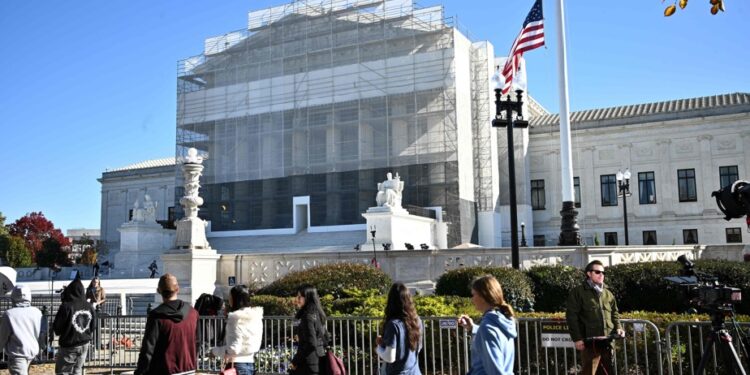(Washington) Supreme Court judges on Wednesday questioned the legality of the customs duties put in place by President Donald Trump in a case likely to shake a pillar of his economic and diplomatic policy.
The hearing, which lasted nearly three hours, was held just one year after the election which allowed the Republican to return to the White House, from where he launched an unprecedented protectionist offensive, with customs duties.
These taxes on imported products generate billions of dollars in revenue and have made it possible to extract investment promises and more favorable conditions for American exporters from the United States’ partners.
The government does not want to see this building collapse and is urging the nine judges of the Supreme Court – six conservatives and three progressives – to maintain them.
The Court’s decision may not be rendered for several months, or conversely be rendered relatively quickly.
On behalf of the executive, legal counsel John Sauer rolled out his arguments at full speed.
In particular, he argued that canceling the tariffs would “expose us to ruthless trade retaliation” from other countries.
Several judges expressed skepticism, noting that the emergency law (IEEPA) invoked by the government does not mention the power to impose customs duties, only that of “regulating imports and exports”.
“Taxation falls under the legislative power. (…) Customs duties are taxes,” declared progressive judge Sonia Sotomayor.
The IEEPA text “is used to impose customs duties, regardless of the product, the country of origin, by choosing the amount and duration,” said conservative judge John Roberts, noting that this seemed to confer “major authority” to the president.
Before the case reached the Supreme Court, several federal jurisdictions declared the affected customs duties – distinct from those affecting specific sectors, such as automobiles and steel – illegal.
The surcharges nevertheless remained in force pending a decision by the country’s highest court.
The government stands up
Donald Trump said Tuesday that maintaining these customs duties was a “MATTER OF LIFE AND DEATH for our country.”
He dispatched top officials to the courtroom.
Finance Secretary Scott Bessent was present, noted an AFP journalist.
PHOTO HASNOOR HUSSAIN, REUTERS ARCHIVES
Treasury Secretary Scott Bessent
Donald Trump has for months described customs duties – “one of the most beautiful words in the dictionary” according to him – as a Swiss army knife.
He prides himself on being able to reindustrialize the country, reduce its chronic trade deficit, collect tax revenue, negotiate from a position of strength with other countries, but also – by imposing taxes against Mexico, Canada and China – curb the fentanyl crisis, a powerful opiate which kills tens of thousands of Americans by overdose each year.
The Republican president invoked the IEEPA economic emergency law of 1977 to decree several rounds of customs duties. He then made them evolve over the course of negotiations or quarrels with other countries.
Small-scale entrepreneurs and Democratic states took the case to court, believing that the president could not encroach on the prerogatives of Congress to impose taxes that affect the lives of businesses and American consumers.
“They impose tariffs on the whole world in peacetime. And they do it by granting themselves power that no president has ever had in our entire history,” said corporate lawyer Neal Katyal.
He was particularly surprised that Swiss products were subject to a 39% surcharge.
Justice Samuel Alito, appointed by a Republican president, asked: “Why would Congress” allow the President of the United States “to impose a quota, a ban, but not a customs duty?” “.



